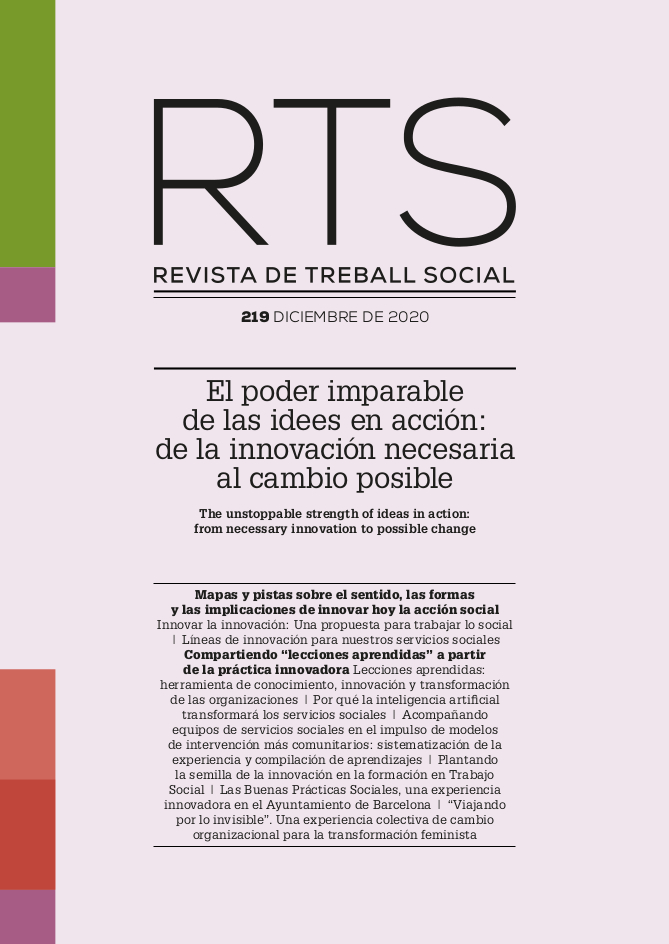This article presents a constructed reflection that reworks and develops previous contributions, based on the author’s involvement in the field of Spanish social services as an independent consultant, and on a review of a host of recent bibliographical references. The starting point is the outline of a general reference framework on how knowledge ecosystems and innovation dynamics operate within different sectors of activity, and on the role of agents such as academia (and the disciplines or areas of knowledge), professions, service provider organisations, research institutions, social movements and others. Subsequently, reference is made to the strategic crossroads that our social services find themselves in, essentially at a turning point, limited and contradictory in terms of their approach and execution, from a comprehensive and residual service to a sector-based and universal one. A number of challenges and innovation trends in our social services are identified below in three sections. 1. Innovation in the operational activity of social intervention, with references to innovation in diagnosis and evaluation, personalisation and empowerment of recipients, digitisation, incorporation of a community and preventative approach, and others. 2. Innovation in organisational aspects, with references to participatory transformations, vertical and horizontal integration, multi-agent
collaborative dynamics on a local or regional level, and other issues. 3. Innovation in shaping the knowledge-based smart governance ecosystem, with references to professional qualification, the relationship between disciplines, and others. Lastly, it concludes with the identification of drivers and obstacles to innovation in our social services and various proposals.
Article
Lines of innovation for our social services
Anderson, Z., Hall, A.-M., Parnaby, J., Davison, E., and Woodall, J. (2019). Bringing people together: how community action can tackle loneliness and social isolation. Londres: National Lottery Community Fund.
Blanco, I., Cruz, H., Martínez, R., and Parés, M. (2016). El papel de la innovación social frente a la crisis. Ciudad y Territorio, 188, 249-260.
Borzaga, C., Galera, G., Franchini, B., Chiomento, S., Nogales, R., and Carini, C. (2020). Social enterprises and their ecosystems in Europe. Luxemburgo: Publications Office of the European Union.
Brandsen, T., Steen, T., and Verschuere B. (ed.) (2018). Co-production and co-creation. Engaging citizens in public services. Nueva York: Routledge.
Bunge, M. (1999). Las ciencias sociales en discusión. Una perspectiva filosófica. Buenos Aires: Sudamericana.
Cottam, H. (2018). Radical help. Londres: Virago.
CTESC (Consell de Treball, Econòmic i Social de Catalunya) (2019). Integració de l’atenció social i sanitaria. Barcelona.
Evers, A., Evert, B., and Brandsen, T. (ed.) (2014). Social innovation for social cohesion. Transnational patterns and approaches from 20 European cities. Giesen: Wilco.
Fantova, F. (2014). Diseño de políticas sociales. Fundamentos, estructura y propuestas. Madrid: CCS.
Ferran, A., Guinot, C., Berasatagui, A., Arrieta, F., Larrion, B., and Zurutuza, S. (2020). Gobernanza colaborativa para la inclusión social. Una experiencia de investigación y acción participativa. Madrid: Los Libros de la Catarata.
Finney, T. (2019). The future is social. Rethinking ageing in place. En Agile Ageing Alliance, Neighbourhoods of the future (p. 184-187). Londres.
Häikiö, L., Fraisse, L., Adam, S., Jolanku, O., and Knutagård, M. (2017). The Janus face of social innovation in local welfare initiatives. En F. Martinelli, A. Anttonen y M. Mätzke (ed.), Social services disrupted. Changes, challenges and policy implications for Europe in times of austerity (p. 281-301). Cheltenham: Edward Elgar Publishing.
Innerarity, D. (2011). La democracia del conocimiento. Por una sociedad inteligente. Madrid: Paidós.
SCIE and LGA (Social Care Institute for Excellence i Local Government Association) (2019). Achieving integrated care. 15 best practice actions. Londres
Longo, F. (2019). La Administración pública en la era del cambio exponencial. Hacia una gobernanza exploratoria. Revista Vasca de Gestión de Personas y Organizaciones Públicas, 3 (núm. especial), 52-73.
Mazzucato, M. (2019). Governing missions in the European Union. Luxemburgo: Publications Office of the European Union.
Misuraca, G., Pasi, G., and Abadie, F. (2017). Innovating EU social protection systems through ICTs. Findings from analysis of case studies in fourteen member states. Sevilla: Joint Research Centre.
Navarro, S. (2020). Pensamiento creativo y acción social innovadora. Madrid: CCS.
OECD (2017). Behavioural insights and public policy: Lessons from around the world. París: OECD Publishing.
Powell, D. (2017). Social care as a local economic solution for the West Midlands. Londres: New Economics Foundation.
Quilter-Pinner, H., McNeil, C., and Hochlaf, D. (2020). The decades of disruption. New social risks and the future of the Welfare state. Londres: Institute for Public Policy Research.
Ramió, C., and Salvador, M. (2019). Gobernanza social e inteligente. Barcelona: Ayuntamiento de Barcelona.
Randle, A. (2017). Location, location, location. Building place-based system change for better social outcomes. En C. Chwalisz, R. Thillaye y E. Kinloch (ed.), New routes to social justice. Empowering individuals and innovative forms of collective action. Londres: Rowman & Littlefield.
Scottish Government (2018). Scotland’s digital health and care strategy. Edimburgo:
SIIS (2019). Revisión de tendencias, innovaciones y buenas prácticas en el ámbito de los servicios sociales, Zerbitzuan, 70, 5-31.
Vega, C., Martínez Buján, R., and Paredes, M. (2018). Experiencias, ámbitos y vínculos cooperativos para el sostenimiento de la vida. En C. Vega, R. Martínez Buján i M. Paredes (ed.), Cuidado, comunidad y común. Extracciones, apropiaciones y sostenimiento de la vida (p. 15-50). Madrid: Traficantes de Sueños.
Viñas, A., Poyatos, P., Morata, T., Marzo, M., López, P., Palasí, E., Sánchez, J., and Fernandez, F. (2018). Valor humà: el model relacional-vincular en el Treball socioeducatiu a Castell-Plaja d’Aro. Barcelona: Departament de Treball, Afers Socials i Famílies.
Wagensberg, J. (2002). Si la naturaleza es la respuesta, ¿cuál era la pregunta? y otros quinientos pensamientos sobre la incertidumbre. Barcelona: Tusquets.





